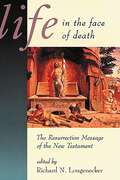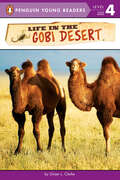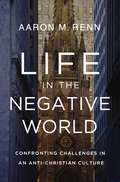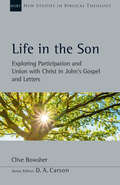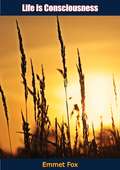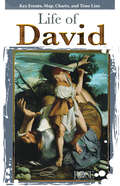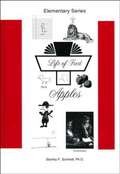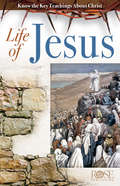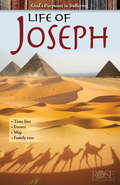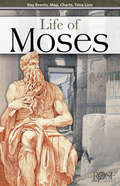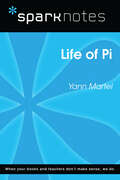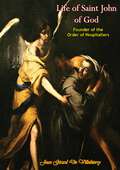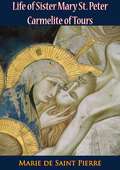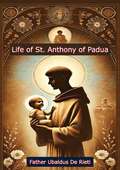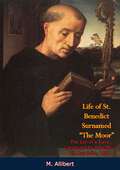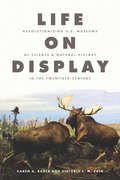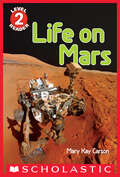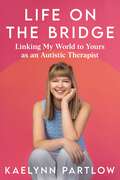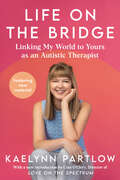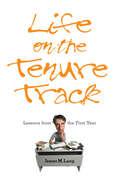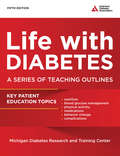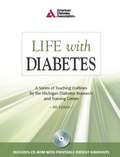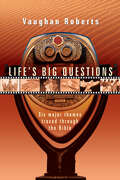- Table View
- List View
Life in the Face of Death: The Resurrection Message of the New Testament
by Richard N. LongeneckerThis book brings into focus the resurrection message of the New Testament. The chapters demonstrate how the resurrection both provides the basis for joyful living now despite the shadow of death and undergirds the Christian belief in a future after death.
Life in the Gobi Desert (Penguin Young Readers, Level 4)
by Ginjer L. ClarkeDiscover the desert in this fact-packed leveled reader!Welcome to the Gobi Desert, where you can find camels, scorpions, and even snow leopards! Explore this huge habitat and meet the many creatures that call it home. But keep an eye out for the ones that are no longer alive, too--the Gobi may have more dinosaur fossils than any other place on Earth! Learn more about this amazing place as well as how you can help protect and preserve it for future generations.
Life in the Negative World: Confronting Challenges in an Anti-Christian Culture
by Aaron M. RennLearning how to live in today's new social and cultural environment will require examination, trial and error, and adaptation over time. But there are ways to live with integrity and follow Christ today, even in a negative world.From a peak in church attendance in the mid-20th century, Christianity has been on a trajectory of decline in the United States. Once positive toward Christianity and Christian moral teachings, cultural shifts toward the mid-90s led many to adopt a more neutral tone toward the Christian faith, seeing it as one option among many in a pluralistic public square. Today, however, Christianity is viewed negatively, and being known as a Christian often means a lower social status in elite society. Christian morality is openly repudiated and viewed as a threat to the new moral order.In Life in the Negative World, author Aaron M. Renn looks at the lessons from Christian cultural engagement over the past 70 years and suggests specific strategies for churches, institutions, and individuals to live faithfully in the "negative" world—a culture opposed to Christian values and teachings. And since there is no one-size-fits-all solution, living as a follower of Christ in the new, negative world and being missionally engaged will require a diversity of strategies.
Life in the Son: Exploring Participation and Union with Christ in John's Gospel and Letters (New Studies in Biblical Theology #Volume 61)
by Clive BowsherThe New Testament writers use spatial language and imagery to portray our relationship with God, speaking both about God or Christ in us and us in them. Believers are also described as possessing and participating in divine qualities such as life and glory. Both aspects are prominent in John's Gospel and letters. However, outside the Pauline writings, union with Christ has hardly been addressed in New Testament scholarship. Clive Bowsher seeks to redress this balance in his New Studies in Biblical Theology volume Life in the Son. In John's Gospel, the oneness of the Father and Son is described as the Father and Son being "in one another." Clive Bowsher's study shows that union with Christ in John's Gospel and letters is the in-one-another relationship of believers with the Father and Son by the Spirit—the intimate, loving, relational participation of the believer and God, each in the life, affections, ways, and work of the other. Insightful and accessible, Bowsher's study also explores connections with the shape of sonship, covenant and the life of the age to come. This volume fills a significant gap in the literature and promises to be a blessing to pastors, preachers, and scholars alike. Addressing key issues in biblical theology, the works comprising New Studies in Biblical Theology are creative attempts to help Christians better understand their Bibles. The NSBT series is edited by D. A. Carson, aiming to simultaneously instruct and to edify, to interact with current scholarship and to point the way ahead.
Life is Consciousness
by Emmet FoxEmmet Fox (1886-1951), notable New Thought leader and writer, was born in Ireland but lived most of his life in England before moving to the United States. His early career was in electrical engineering, but he had become interested in the New Thought movement as a young man and finally gave his first metaphysical lecture in London in 1978.During a visit to the United States in 1931, Dr. Fox accepted the position of minister of the Church of the Healing Christ in New York City. As a Divine Science minister, he was highly successful for the rest of his active life.Emmet Fox had a high regard for the Unity Church. In 1936 he visited Unity headquarters in Kansas City Missouri, and spoke to the workers. This short book is the substance of that address.Life Is Consciousness first appeared in the October 1936 edition of Unity Magazine, and presents important beliefs and ideas of one of the early New Thought leaders. The teachings of any movement evolve over time, and the material included here represents the author’s interpretation of New Thought ideas at a given period in history.
Life of David
by Rose PublishingExperience the convenience of having this amazing Bible Study Tool at your fingertips--wherever you go! Plus, you can read, search, enlarge, and print the pamphlet right off your computer.This handy 14-page guide gives you the entire life of King David at a glance. From humble beginnings as a shepherd boy to king over Israel, David is one of the most beloved and impressive characters in the Bible. Despite many personal failures and weaknesses, David went down in history as "a man after God's own heart." Examine in detail the historical background of biblical events, a map of Bible places, This Bible pamphlet tracks every major event in King David's life as well as the important people around him. See David's life at a glance and know all of the key stories: David and Goliath, David and Jonathan, Saul's jealously and attacks on David's life, David's marriage to Michal, Abigail, and more. Complete with maps, charts and time lines, this pamphlet explores the life of Jesus' most famous ancestor. Perfect for the busy person who wants an overview of key themes and events.Time line covers these keys events:*David is born*Samuel anoints David as king*Saul becomes jealous of David's popularity and success*David kills Goliath*Saul's son Jonathan declares lifelong friendship with David*David commands some of King Saul's troops*David marries King Saul's daughter, Michal*Saul tries to kill David; David lives in exile*Saul takes Michal and marries her to another man*David gathers a band of soldiers; they fight Israel's enemies*David spares Saul's life*Nabal refuses hospitality to David*David marries Abigail and Ahinoam*David spares Saul's life a second time*David lives among the Philistines*Samuel dies*King Saul and son Jonathan die in battle with Philistines*David made king of Judah at age 30 in Hebron; Ishbosheth made king of Israel by Abner*Six sons born, including Absalom and Adonijah*David rules in Hebron 7 years and 6 months*Abner, cousin of King Saul, supports Saul's son Ishbosheth until insulted*Ishbosheth murdered by own generals*David marries four more wives and takes several concubines, has more children*David made king of Israel; conquers Jerusalem and makes it his capitol; rules 33 years*David defeats the Philistines at Baal Perazim*David orders the Ark of the Covenant to be returned to Shiloh from Kiriath Jearim*Celebration when the Ark returns; Michal scorns David's fervor*God promises that David's kingdom will last forever*David consolidates kingdom by victories over Philistines, Moabite, Arameans, Edomites, and Ammonites*David takes Jonathan's son Mephibosheth into his household*David kills Uriah and marries Bathsheba*Absolom rebels against his father*David averts plague by a sacrifice to God on what would later be the Temple Mount*David dies, leaves kingdom to son Solomon
Life of Fred Australia
by Stanley F. SchmidtThe World, Questions, Letter Writing, Snack Time, The Call, Geography, Packing, How to Get There, On the Bus, Replacing the Bus that Smoked, Wichita, Ask, Flying, Lost, Boarding, Australia, Sydney, In a Hurry, Wagga Wagga.
Life of Fred: Apples
by Stanley F. SchmidtThis book covers beginning mathematics including: Numbers that Add to 7, Circles, Ellipses, Reading a Clock, 5 + ? = 7, Days of the Week, Leap Years, Spelling February, 15 Degrees Below Zero (-15º), Counting by Fives, 3x + 4x = 7x, ante meridiem (a.m.), One Million Squares, The "There Are Zero . . ." Game Sets, the Popularity of Zero Triangles, (not equal), x + 4 = 7, One Thousand, Counting by Hundreds, Rectangles, and much more . . .
Life of Fred: Decimals and Percents
by Stanley F. SchmidtA math book covering decimals and percents.
Life of Jesus
by Rose PublishingWho is Jesus and how is he different from all other religious leaders? This question lies at the heart of the good news of Jesus Christ. In Life of Jesus, a full-color ebook, you'll see how Jesus and the New Testament writers answered this important question in their own words, and be able to answer questions from believers and skeptics about who Jesus really is.In Life of Jesus, you will discover why Jesus came, what he taught, what he did-and why it matters now. Jesus asked his disciples in Matthew 16:13 who people were saying he was. Life of Jesus delves further into this question by exploring the following questions:•Who is Jesus?•What was his message?•Why did he come?•Why did he die?•What about the empty tomb?Each question is followed by an explanation of what Jesus himself said in response to the question and what others have said as well. Life of Jesus will help you discover Bible verses that point to the true nature of Christ and understand how the seemingly complex ideas about Jesus Christ are formed from the Biblical text. You'll also find out what Jesus said about the topics of Love, God, and Eternal life!Life of Jesus also includes a time line of Jesus' life that covers the important events in his life. A chart of key beliefs about Jesus presents the meaning, scripture that explains the belief, and the importance of the belief to the Christian. Life of Jesus is a wonderful introduction to our Savior or refresher for seekers, new believers, and life-long Christians.
Life of Joseph: God's Purposes in Suffering
by Rose PublishingIs God really in charge? Where is he when everything goes wrong? The Life of Joseph shows how God can take misfortune and evil and turn it into great good. Joseph was betrayed by people close to him and had every reason to grow bitter, yet continued to obey God. And God was working behind the scenes to change Joseph and his family.The Life of Joseph is a easy-to-use, beautifully illustrated guide through God's purposes in suffering. This pamphlet follows the story of Joseph from the beginnings of God's promise to Abraham to the reconciliation of Joseph's family in Egypt. Life of Joseph includes a time line of the important events in the lives of Joseph and his family, as well as a family tree of Jacob's (Israel) sons. Life of Joseph also includes a side-by-side comparison of the dreams Joseph interpreted and how God was working in the lives of Joseph, Jacob, his brothers, and Judah to ultimately bring about the promised Messiah, Jesus!Life of Joseph helps us see meaning in suffering and aids us in our own journey toward wisdom. Includes a map and time line. Why is Joseph's story so compelling? Look at Joseph's life at age 17:*Favored excessively by his father*Hated by his 10 older brothers, who had a history of violence and treachery.*Thrown into a pit in the wilderness*Sold into slavery and never returned home again.*His parents were given proof he was dead and no search was instigatedLater, when it appeared his life was improving, he was...*Stalked by someone powerful and vengeful*Falsely accused and imprisoned*Abandoned in jail without friends or defenders*Forgotten by people who owed him a favorTo any observer, it would appear that God had abandoned Joseph.But invisibly God was working behind the scenes. Life of Joseph brings the fascinating story of Jacob, Joseph, and his family to life and is a resource you will be referring to again and again as you study the book of Genesis.
Life of Moses
by Rose PublishingBoost Your Moses IQ in Less Than 30 minutes. "My earnest prayer is that you... may see in the action of Moses an example for yourselves."-Charles SpurgeonAlready a Moses-expert? Boost your Moses IQ in less than 30 minutes with Rose Publishing's Life of Moses.You may know him as the great Lawgiver, the leader who parted the Red Sea, and the prophet who provided the Israelites with provision in the desert. But few realize Moses' insecurities...his hidden fears and anxieties. Get to know the real Moses: the 80-year-old man who hated the limelight, feared public speaking, and doubted God's call at first.Life of Moses pamphlet gives you 100's of facts--at your fingertips. Its full-color comparison charts, pictures, maps, and time lines allow you to easily understand Moses' family drama; track his Exodus journey; and uncover his personal struggles. In its thorough overview, you learn Moses' full story and its symbolic meaning without having to rummage through several heavy reference books and confusing commentaries.Moses gave us more than the Ten Commandments; he gave us an example to learn from. Find out how you can gain the confidence to follow God's will just as Moses did, and discover how God transforms our weaknesses and failures into strengths by getting Life of Moses today.Want to Discover More? Check out Life of Moses' Visual Features* Time line featuring Moses' major life events.* Map of the Exodus route. * Comparison chart on major events between Moses and Israel.* Comparison chart between Moses and Jesus.* Chart summarizing Moses' instructions in Deuteronomy.* Illustrations of Moses throughout his life. These visuals provide you with loads of information at a glance.
Life of Pi (SparkNotes Literature Guide Series)
by SparkNotesLife of Pi (SparkNotes Literature Guide) by Yann Martel Making the reading experience fun! Created by Harvard students for students everywhere, SparkNotes is a new breed of study guide: smarter, better, faster. Geared to what today's students need to know, SparkNotes provides: *Chapter-by-chapter analysis *Explanations of key themes, motifs, and symbols *A review quiz and essay topicsLively and accessible, these guides are perfect for late-night studying and writing papers
Life of Saint John of God Founder of the Order of Hospitallers
by Jean Girard De VillethierryImmerse yourself in the inspiring and transformative story of one of the most revered saints in Christian history with Jean Girard De Villethierry's Life of Saint John of God: Founder of the Order of Hospitallers. This detailed biography offers an intimate and comprehensive portrait of Saint John of God, a man whose life of compassion and service left an indelible mark on the world.Jean Girard De Villethierry, a distinguished historian, meticulously traces the life journey of John of God, from his humble beginnings in Portugal to his profound spiritual awakening and his ultimate mission to care for the sick and poor. This biography captures the essence of John of God's character, his unwavering faith, and his extraordinary dedication to humanitarian service.Life of Saint John of God delves into the pivotal moments of his life, including his dramatic conversion experience, his founding of the Order of Hospitallers, and his tireless work in establishing hospitals and caring for those in need. Villethierry's narrative brings to life the trials and triumphs of John of God, highlighting his deep empathy, relentless perseverance, and the miraculous events that marked his ministry.The book also explores the broader historical and social context of the 16th century, providing readers with an understanding of the challenges and opportunities that shaped John of God's mission. Villethierry's scholarly yet accessible writing offers insights into the saint's spiritual philosophy, his approach to healthcare, and the lasting impact of his work on the Christian tradition and beyond.Life of Saint John of God is an essential read for anyone interested in the lives of the saints, the history of Christian charity, and the enduring power of faith in action. Jean Girard De Villethierry's biography is a testament to the remarkable legacy of Saint John of God, whose life continues to inspire acts of compassion and service around the world.
Life of Sister Mary St. Peter Carmelite of Tours: Written by Herself, Arranged and Completed With the Aid of Her Letters and the Annals of Her Monastery
by Marie de Saint PierreMary of Saint Peter (French: Marie de Saint-Pierre; 4 October 1816 – 8 July 1848) was a Discalced Carmelite nun who lived in Tours, France. She is best known for starting the devotion to the Holy Face of Jesus which is now one of the approved Catholic devotions and for the Golden Arrow Prayer. She also introduced the "Little Sachet" sacramental.
Life of St. Anthony of Padua
by Father Ubaldus De RietiLife of St. Anthony of Padua by Father Ubaldus de Rieti is a compelling biography that brings to life the extraordinary journey of one of the most beloved saints in the Catholic tradition. Known as the "Wonder-Worker" for his many miracles and as the "Hammer of Heretics" for his powerful preaching, St. Anthony of Padua is revered not only as a model of holiness but also as a profound teacher and intercessor.This work traces Anthony’s life from his early years in Lisbon, Portugal, to his entry into the Franciscan Order and his tireless missionary work across Italy and France. Father Ubaldus provides vivid accounts of Anthony’s spiritual awakening, his devotion to the poor, and the extraordinary events that defined his ministry, including miraculous healings, conversions, and encounters with skeptics. Through these stories, the book offers a glimpse into Anthony’s deep love for Christ and his unwavering commitment to spreading the Gospel.The biography also highlights Anthony’s renowned gift for preaching, which drew large crowds and inspired countless souls. Known for his ability to communicate complex theological truths with clarity and simplicity, Anthony’s teachings continue to influence Christians worldwide. Father Ubaldus emphasizes the saint’s humility, faith, and compassion, qualities that made him not only a great preacher but also a tireless servant of those in need.Life of St. Anthony of Padua is more than just a historical account—it is a spiritual reflection on the enduring legacy of a saint whose life was marked by faith, charity, and miraculous works. For devotees, scholars, and those seeking inspiration, this book offers a rich narrative of St. Anthony’s life and invites readers to follow his example of humility, prayer, and service to others.
Life of St. Benedict Surnamed “The Moor” The Son of a Slave: Canonized by Pope Pius VII, May 24th, 1807
by M. AllibertBenedict the Moor was born a slave near Messina, Italy. He was freed by his master, became a solitary, eventually settling with other hermits at Montepellegrino. He was made superior of the community, but when he was about thirty-eight, Pope Pius IV disbanded communities of solitaries and he became a Franciscan lay brother. He cooked at St. Mary's convent near Palermo. He was appointed against his will, superior of the convent when it opted for the reform, though he could neither read nor write. After serving as superior, he became a novice master but asked to be relieved of his post and returned to his former position as cook. His holiness, reputation for miracles, and his fame as a confessor brought hordes of visitors to see the obscure and humble cook.
Life on Display: Revolutionizing U.S. Museums of Science and Natural History in the Twentieth Century
by Karen A. Rader Victoria E. M. CainRich with archival detail and compelling characters, Life on Display uses the history of biological exhibitions to analyze museums’ shifting roles in twentieth-century American science and society. Karen A. Rader and Victoria E. M. Cain chronicle profound changes in these exhibitions--and the institutions that housed them--between 1910 and 1990, ultimately offering new perspectives on the history of museums, science, and science education. Rader and Cain explain why science and natural history museums began to welcome new audiences between the 1900s and the 1920s and chronicle the turmoil that resulted from the introduction of new kinds of biological displays. They describe how these displays of life changed dramatically once again in the 1930s and 1940s, as museums negotiated changing, often conflicting interests of scientists, educators, and visitors. The authors then reveal how museum staffs, facing intense public and scientific scrutiny, experimented with wildly different definitions of life science and life science education from the 1950s through the 1980s. The book concludes with a discussion of the influence that corporate sponsorship and blockbuster economics wielded over science and natural history museums in the century’s last decades. A vivid, entertaining study of the ways science and natural history museums shaped and were shaped by understandings of science and public education in the twentieth-century United States, Life on Display will appeal to historians, sociologists, and ethnographers of American science and culture, as well as museum practitioners and general readers.
Life on Mars (Scholastic Reader, Level 2)
by Mary Kay CarsonDiscover the truth about life on Mars in this level 2 reader!Mars is a cold, desert planet with no water. But it wasn't always like this. Could there once have been living things there? Find out in this new level 2 reader all about life on Mars. Includes the most stunning and up-to-date photographs from NASA.
Life on the Bridge: Linking My World to Yours as an Autistic Therapist
by Kaelynn PartlowFrom Autistic Advocate, Love on the Spectrum cast member, and therapist Kaelynn Partlow, a warm, personal, and practical guide to understanding autism—from behaviors to communication and beyond.You've heard from autistic authors.You've heard from therapists.Now hear from one extraordinary young woman who's both.Experience autism from the inside out through a rare fusion of professional skill and personal understanding. Reshape what you know about the autism spectrum and increase your ability to give support. Varied perspectives among autistic individuals, their families, and professionals have often been difficult to reconcile. Now, you can bridge that divide with guidance from someone who’s lived in multiple worlds. Find immediate, actionable options to build connections, foster communication, navigate challenges, and enhance interactions.SPECIFIC CONTENT:Autism. What it is, what it isn’t, and what are the resulting misunderstandings across the spectrum?Communication. Exactly how do you avoid misunderstandings, encourage conversation, and build options for better interaction?Behavior. Learn about the origin and mechanics of meltdowns, stimming, perseveration, sensory distortion, and other common autistic challenges.Interaction. The struggles are real: autism-enhanced loneliness, social-skill deficits, goal-setting, and the thorny issues of disability accommodation.Common Questions. What are DSM-V diagnostic levels and why do they matter? What about therapy and ABA or routes to useful advocacy?"Loved Kaelynn Partlow's information on ambiguity and communication. She gives lots of practical pointers on how to be more direct and specific when talking to autistic individuals. Vague, open ended questions are not effective communication." — Temple Grandin, New York Times bestselling author of Visual Thinking: The Hidden Gifts of People Who Think in Pictures, Patterns, and Abstractions"As a rising star in the field, Partlow is poised to become this generation’s Temple Grandin." — Erin R. Hahn, Ph.D., Department Chair and Professor of Psychology, Furman University
Life on the Bridge: Linking my world to yours as an autistic therapist
by Kaelynn PartlowFrom Autistic Advocate, Love on the Spectrum cast member, and therapist Kaelynn Partlow, a warm, personal, and practical guide to understanding autism—from behaviors to communication and beyond. <p> You've heard from autistic authors. You've heard from therapists. Now hear from one extraordinary young woman who's both. <p> Experience autism from the inside out through a rare fusion of professional skill and personal understanding. Reshape what you know about the autism spectrum and increase your ability to give support. Varied perspectives among autistic individuals, their families, and professionals have often been difficult to reconcile. Now, you can bridge that divide with guidance from someone who’s lived in multiple worlds. Find immediate, actionable options to build connections, foster communication, navigate challenges, and enhance interactions.
Life on the Tenure Track: Lessons from the First Year
by James M. LangIn this fast-paced and lively account, Jim Lang asks—and mostly answers—the questions that confront every new faculty member as well as those who dream of becoming new faculty members: Will my students like me? Will my teaching schedule allow me time to do research and write? Do I really want to spend the rest of my life in this profession? Is anyone awake in the backrow?Lang narrates the story of his first year on the tenure track with wit and wisdom, detailing his moments of confusion, frustration, and even elation—in the classroom, at his writing desk, during his office hours, in departmental meetings—as well as his insights into the lives and working conditions of faculty in higher education today. Engaging and accessible, Life on the Tenure Track will delight and enlighten faculty, graduate students, and administrators alike.
Life with Diabetes
by Martha M. FunnellLife With Diabetes is a series of teaching outlines developed and tested by the Michigan Diabetes Research and Training Center, affiliated with the Department of Medical Education of the University of Michigan Medical School. Previous editions of this teaching curriculum have been used by thousands of educators in diabetes clinics throughout North America to help their patients understand and live with the many challenges of diabetes. Each of the 22 topical chapters are detailed guides that give all the information an educator needs to cover a topic completely, yet allows each educator to speak to their patients in his or her own voice at a pace that is appropriate for each individual and class. Each topical chapter includes illustrations that can be used to show and teach important concepts, e.g., carbohydrate counting and how to manage stress, and necessary daily tasks, e.g., monitoring blood glucose and meal planning. There is also an extensive support material section that helps educators manage their educational programs.Life With Diabetes is the one book that every diabetes educator and clinic must have to provide complete and accurate health care to their diabetes patients.
Life with Diabetes
by The Michigan Diabetes Research and Training CenterThe best selling and most relied upon diabetes education curriculum in North America has just gotten better. Life with Diabetes is a sought-after resource that has aided thousands of diabetes professionals as they assist patients in learning the information and skills needed for diabetes self-care. This new edition provides a patient-centered approach that helps you make meaningful and informed choices. Each of the 22 outlines incorporates psychological and behavioral principles for teaching necessary self-care strategies. Each chapter outline includes:Teaching tips, visuals, and handouts for classroom useEvaluation plans and suggested readingsPlus, a full-content, searchable CD-ROMLife With Diabetes, Fourth Edition is concise, tested, and an effective diabetes curriculum.
Life's Big Questions: Six Major Themes Traced Through the Bible
by Vaughan RobertsHow can the sixty-six books of the Bible have a single message for us today? What unites the vastly different accounts of God's work in the world? How do the various genres of the Bible work together? Vaughan Roberts believes that the Bible tells a single story for all time. He draws out the Bible's message of Jesus Christ and God's redemption through him in six big questions:Who rules the world?What does it mean to be human?How should we view money?Is a perfect relationship possible?How does the Holy Spirit work in the world and in our lives?What is God's plan for the world?God's Big Picture
